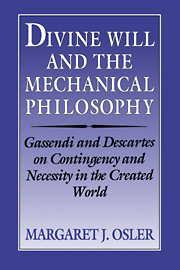 Divine Will and the Mechanical Philosophy
Divine Will and the Mechanical Philosophy Book contents
- Frontmatter
- Contents
- Acknowledgments
- Introduction
- Part I Theology and the philosophy of nature
- 1 Divine power and divine will in the Middle Ages: Historical and conceptual background
- 2 Baptizing Epicurean philosophy: Gassendi on divine will and the philosophy of nature
- 3 Providence and human freedom in Christian Epicureanism: Gassendi on fortune, fate, and divination
- 4 Theology, metaphysics, and epistemology: Gassendi's “science of appearances”
- 5 Eternal truths and the laws of nature: The theological foundations of Descartes' philosophy of nature
- 6 Gassendi and Descartes in conflict
- Part II The mechanical philosophy and the formation of scientific styles
- Bibliography
- Index
5 - Eternal truths and the laws of nature: The theological foundations of Descartes' philosophy of nature
Published online by Cambridge University Press: 11 September 2009
- Frontmatter
- Contents
- Acknowledgments
- Introduction
- Part I Theology and the philosophy of nature
- 1 Divine power and divine will in the Middle Ages: Historical and conceptual background
- 2 Baptizing Epicurean philosophy: Gassendi on divine will and the philosophy of nature
- 3 Providence and human freedom in Christian Epicureanism: Gassendi on fortune, fate, and divination
- 4 Theology, metaphysics, and epistemology: Gassendi's “science of appearances”
- 5 Eternal truths and the laws of nature: The theological foundations of Descartes' philosophy of nature
- 6 Gassendi and Descartes in conflict
- Part II The mechanical philosophy and the formation of scientific styles
- Bibliography
- Index
Summary
All philosophy is like a tree, of which the roots are metaphysics, the trunk is physics, and the branches coming from this trunk are all the other sciences.
René Descartes, Principes de la philosophieLike Gassendi, Descartes belonged to the early-seventeenth-century community of natural philosophers committed to Galilean science and the mechanical philosophy. Educated by the Jesuits at La Flèche – where Mersenne was also a student from 1604 to about 1609 – Descartes qualified as a lawyer at the University of Poitiers in 1616, after which he served as an officer in the army of Prince Maurice of the Netherlands and then spent several years traveling in Europe. He had a significant encounter with Isaac Beeckman in 1619 and, like Gassendi, found contact with the Dutch schoolmaster extremely stimulating. Shortly after meeting Beeckman, Descartes dedicated himself to the pursuit of natural philosophy. He settled permanently in the Netherlands in 1629, remaining there until his final, fatal move to Sweden in the last year of his life. He corresponded frequently with Mersenne and many other natural philosophers, including Beeckman, Constantijn Huygens (father of the physicist Christiaan), William Cavendish, the brothers Jacques and Pierre DuPuy, Jean-Baptiste Morin, Gassendi, Hobbes, and Henry More. His letters contain a wealth of information about key issues in seventeenth-century natural philosophy.
Descartes published a number of important and widely read works in natural philosophy.
- Type
- Chapter
- Information
- Divine Will and the Mechanical PhilosophyGassendi and Descartes on Contingency and Necessity in the Created World, pp. 118 - 152Publisher: Cambridge University PressPrint publication year: 1994


